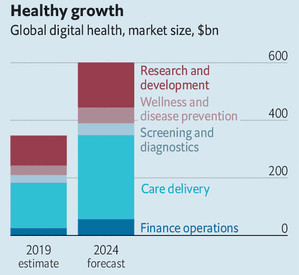Digital Health: India keeps Pace with Global trends to transform Entire Continuum of Care
India has been facing the high burden of both Communicable and Non – Communicable diseases. Indian health systems are mainly focused on secondary and tertiary care. Efficient and effective services are not available due to poor access and affordability. However, with the implementation of Ayushman Bharat Mission in 2018, a new healthcare ecosystem was created in the country and digital health also got a major push by the Indian government. Digital health has been accorded a special priority for the successful implementation of the Ayushman Bharat Mission and to ensure the benefits reach the last mile. With digital disruptions, India has also kept the pace with global trends to revolutionise its entire continuum of care and made significant progress in the last two years.

Digital health is a globally successful phenomenon and India has also been adopting some of the best practices. In terms of progress, the country is not far behind compared to leading countries such as the Netherlands, Canada (British Columbia), Estonia, Australia among others. In digital health space, both the public and private sectors are working together to create a win-win situation for digital healthcare delivery.
Digital tools have already penetrated in the healthcare space, though still lagging compared to the banking or travel sectors. Enterprising firms, from health-app startups and hospitals to insurers, pharmacies and tech giants have entered this space to provide a wide range of services.
According to McKinsey, global digital-health revenues—from telemedicine, online pharmacies, and wearable devices will rise from $350 billion in 2019 to $600 billion in 2024. The same is happening in China, India, Europe and most other places. It is widely admitted that this huge business has been accelerated by COVID-19. According to some research firms, a record equity funding was recorded for digital health startups globally and during the pandemic over 100 per cent increase was registered compared to the previous year. Digital tools such as sensors, cloud computing, data analytics, internet of things (IoT) and artificial intelligence(AI) are becoming medical-grade just as the risk of contracting covid-19 in hospitals and clinics makes their adoption look more enticing than ever.
In India, with improved health outcomes, there will be an increase in productivity which will lead to an ‘additional benefit of USD 200-250 billion to India’s GDP’ as estimated by the BCG in its recent report on Digital Health. “This value will accrue as a result of three big shifts- Patient Trust, Diagnosis Rate, and the rising demand for health insurance products,” it says.
Meanwhile, the recent findings of a survey conducted by Healthcare Federation of India (NATHEALTH) revealed that even before COVID-19 hit India, the move towards digital health was significant and COVID-19 has played a pivotal role in accelerating the pace and also made digital health usage non-negotiable in the present times. Based on the findings, NATHEALTH has strongly recommended the Public-Private Partnership (PPP), a boost to digital startup, infrastructure, and ensuring last-mile connectivity.
According to the survey before COVID-19, 61 per cent of the patients were scheduling appointments through mobile apps and 70 per cent of patients were using digital technology methods to monitor their health at home. E- Pharmacy and Tele-health are expected to play a vital role in making digital health a growing phenomenon in India.
Not only there was a significant increase in the usage of digital health by the patients, but physicians also saw a significant jump in the use of digital tools to deliver patient care. An important point that came out from the survey was that the Government’s Swasth app was being used prominently by the public and private players, plus the patients. Big multinational companies have also joined hands with Indian Health Institutions. For example, Siemens Healthineers, a big German health-tech firm, is working with Apollo Hospitals to expand remote patient monitoring. Now patients can use an app to get drug refills, teleconsultations and remote diagnoses—and even secure a medical loan through Apollo’s partnership with HDFC Bank.
A robust digital ecosystem surely ensures that access undergoes a fundamental shift with increased adoption of digital services delivery models such as e-consultation, e-pharmacy, e-diagnostics and e-ICU. With this, it is expected that the demand for quality OPD Services would be increased.
Technology is but one dimension of health sector transformation. A multi-pronged approach is needed to make a significant impact in terms of health outcomes. The NDHM, spearheaded by Dr Indu Bhushan, CEO, National Health Authority (NHA) is expected to play a critical role in catalyzing a robust digital infrastructure for the Indian healthcare ecosystem. A sincere effort to make a comprehensive strategy for bringing in fundamental changes in healthcare would also open a range of market opportunities for all stakeholders.
The NDHM is a major step in the evolution of a digital health ecosystem. It is based on a set of principles, standards, and core building blocks. It would also enable faster adoption of disruptive technologies like AI/ML and IoT to achieve a quantum jump in the quality of healthcare and ease of access.
Digital Health and virtual care will allow to effectively meeting the healthcare needs of more Indians than ever before. The initiatives are expected to accelerate India’s journey towards universal health care and open multiple economic opportunities for all stakeholders.
